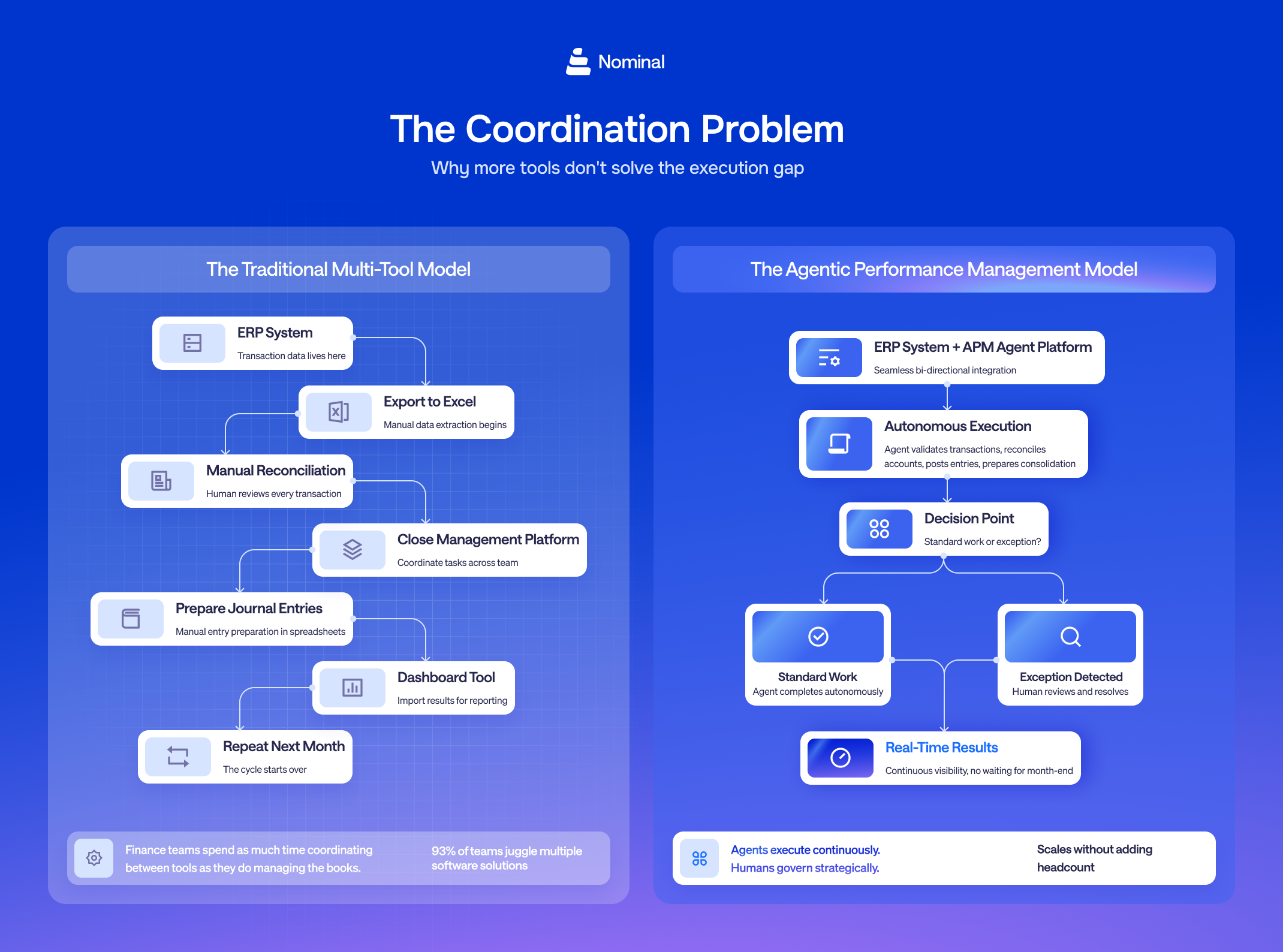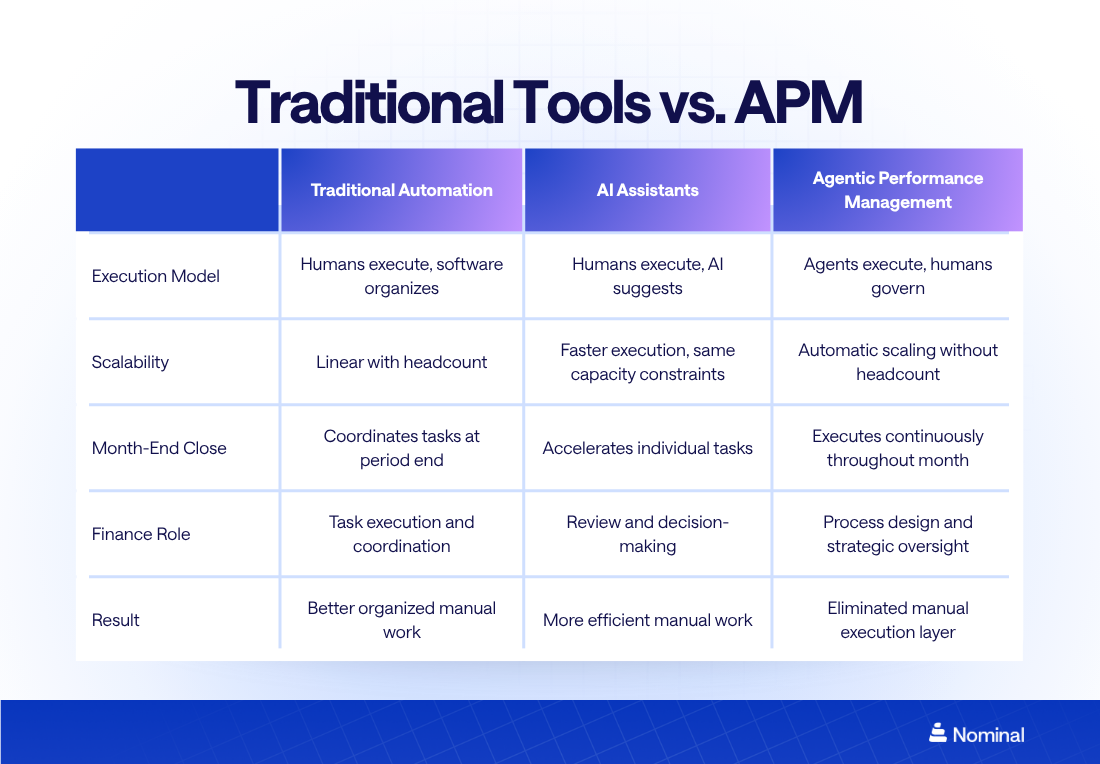
Finance teams have more software than ever, yet manual workload keeps growing. The issue isn't visibility or assistance. Its execution capacity. Agentic Performance Management introduces autonomous agents that own and execute complete accounting workflows, transforming finance from a coordination function into a continuous operational system.
Finance leaders have spent the last decade investing in technology. ERPs promised unified data. Dashboards delivered real-time visibility. Close management platforms organized checklists. AI copilots offered smart suggestions. Yet despite all this investment, the manual workload hasn't decreased. In many cases, it has grown.
Controllers still spend their days coordinating reconciliations across entities. Accountants still chase down intercompany mismatches in spreadsheets. Finance managers still prepare the same variance explanations every month, just faster. The tools changed. The work didn't.
According to Norwest Venture Partners, 93 percent of finance teams still juggle multiple software solutions. Each tool promised to solve a specific problem. Together, they created a new one: coordination overhead. Finance teams now spend as much time managing software as they do managing the books.
This isn't a story about bad technology. It's a story about the wrong architecture. Most finance software was built to assist humans, not replace the manual layer. The result is a function that looks modern on the surface but still operates like it did twenty years ago. Faster approvals. Better dashboards. Same bottlenecks.
The answer isn't another tool. It's a fundamentally different model where systems don't just help finance teams work but actually do the work.
The Real Problem Isn't Visibility. It's Execution Capacity
Visibility has never been better. Finance leaders can see account balances in real-time, track close progress across entities, and generate dashboards on demand. The problem is that seeing the work doesn't reduce it.
Behind every dashboard is someone reconciling accounts manually. Behind every close checklist is someone preparing journal entries in spreadsheets. Behind every variance report is someone drafting explanations from scratch. Visibility showed the bottlenecks but didn't remove them.
Research shows that 90 percent of organizations still rely on spreadsheets for essential finance processes like reconciliations and variance analysis. Even teams with advanced ERPs and close platforms end up exporting data into Excel because that's where the actual work happens. The tools organize. Humans execute.
According to Rippling, 44 percent of finance leaders say their teams spend more than half their time on administrative tasks like reconciling, matching receipts, and processing invoices. Tool investment alone hasn't freed up that capacity.
The issue is structural. Traditional automation follows fixed rules. AI assistants provide suggestions. Workflow tools route approvals. But none of these actually perform the underlying accounting work. Someone still has to match the transactions, post the entries, and prepare the consolidation.
Agentic Performance Management solves this by introducing autonomous execution into core workflows. Instead of tools that assist accountants, it deploys agents that own complete processes and execute without waiting for human intervention. Finance teams govern outcomes instead of managing every step.
The issue is structural. Traditional automation follows fixed rules. AI assistants provide suggestions. Workflow tools route approvals. But none of these actually perform the underlying accounting work. Someone still has to match the transactions, post the entries, and prepare the consolidation.
Recommended read: Why AI in Finance Can’t Be Ignored
Why Adding More Software Doesn't Solve a Coordination Problem

The finance technology market has exploded. CFO Dive reports that the "office of the CFO software market" now includes more than 300 tech companies selling finance tools. In the 2024 "Top Tools Shaping Finance" report by CFO Connect, 155 finance leaders recommended 34 essential finance tools.
Thirty-four essential tools. That's not a stack, it’s a full-time job just managing integrations.
Every new tool promises automation, faster reconciliations, smarter matching, and better reporting. And each one delivers incremental improvement within its narrow scope. But the tools don't talk to each other naturally. Data still gets exported, transformed, and imported. Processes still span multiple systems. And someone still has to coordinate it all.
The cost isn't just financial, though subscription fees add up quickly. The real cost is complexity. Each tool adds another interface to learn, vendor to manage, integration to maintain. When something breaks, teams spend hours troubleshooting across platforms to find the source of the error.
This fragmentation creates a new kind of manual work. Instead of reconciling accounts manually, teams now reconcile systems manually, becoming IT coordinators instead of financial analysts and spending time managing technology instead of interpreting results.
The problem is architectural, not functional. Finance operations were designed around human coordination. Software layered on top of that model can digitize checklists, route approvals faster, and suggest matches more intelligently. But it can't eliminate the coordination layer because that's where humans still live in the workflow.
What Makes Agentic Performance Management Different
Agentic Performance Management represents a structural departure from traditional finance software. Where conventional tools assist human work, APM platforms execute the work themselves through autonomous agents that own complete accounting workflows.
When an agent takes responsibility for month-end close at a specific entity, it validates transactions continuously throughout the month rather than waiting for period end. It executes standard journal entries based on patterns learned from prior cycles, reconciles accounts in real time, and prepares close documentation automatically. The agent escalates only genuine exceptions that require human judgment while handling everything else independently.
Finance teams review final outputs and approve completed work rather than managing individual steps or coordinating between systems. This represents replacement of the manual layer, not enhancement of existing workflows.
The distinction becomes clear when examining multi-entity consolidation. Traditional consolidation tools provide templates and validation rules. AI assistants suggest potential intercompany matches. Yet someone still must perform the elimination entries, handle currency translation across entities, and prepare the consolidated financial statements.
Under Agentic Performance Management, an agent owns the entire consolidation workflow from start to finish. It matches intercompany transactions automatically, prepares elimination entries based on ownership structures, handles currency translation using real-time rates, and produces consolidated financials without human intervention unless exceptions arise. The agent performs rather than suggests. That fundamental difference determines whether finance operations scale gracefully with complexity or collapse under its weight.

Related post: Breaking the CFO's Impossible Triangle: Speed, Accuracy, and Cost
How APM Changes the Role of Finance Leaders
Autonomous execution fundamentally reshapes what finance professionals do and how they create value. Controllers evolve from task managers coordinating checklists into process architects designing workflows that agents execute. Instead of reviewing every reconciliation manually, they govern exceptions and validate outcomes at a strategic level. Finance professionals apply judgment and expertise to process design rather than burning capacity on administrative execution.
Organizations gain the ability to scale operations without proportional headcount increases. When the business acquires new entities, agents scale their execution automatically. When transaction volumes double during rapid growth, execution capacity remains constant rather than becoming a bottleneck. When regulations change, agents adapt their workflows without requiring complete process redesign or retraining.
The operational benefits manifest immediately in shorter close cycles, reduced bottlenecks, and increased time for variance analysis. Finance leaders finally possess what they've always needed but never achieved: operational capacity that grows with business complexity. This transformation changes planning conversations with leadership, alters hiring strategies, and expands what becomes possible when executives ask for faster closes or more detailed reporting.
Explore more on this topic: How to Scale Finance Operations Without Adding Headcount: Data-Driven Insights from 50 Million Transactions
Why This Moment Demands a New Model
Finance has reached an operational inflection point where expectations and complexity are accelerating faster than teams can adapt using traditional coordination models. Global operations require multi-entity consolidations across multiple currencies and jurisdictions. Modern audit standards demand continuous controls testing with comprehensive documentation. Board expectations center on real-time visibility and rapid insight generation. These demands arrive simultaneously while finance headcount remains flat or contracts under efficiency pressure.
Traditional automation delivered meaningful improvements initially. RPA handled simple data transfers. Workflow platforms digitized approval routing. AI assistants provided intelligent suggestions. Yet these approaches have reached their architectural limits, accelerating coordination without eliminating the fundamental need for human orchestration at every step.
Agentic Performance Management emerges now because enabling technology has finally caught up to operational necessity. Modern AI agents reason effectively about accounting logic, adapt intelligently to exceptions, and execute complete workflows without constant supervision. Deep ERP integrations enable continuous bidirectional data flow while cloud architectures support real-time processing at enterprise scale.
Finance teams require genuine transformation rather than incremental improvement. They need systems that work autonomously on their behalf instead of tools that require constant human attention.
From Tools That Help to Systems That Handle It
The finance organizations that will lead over the next decade won't distinguish themselves through larger software budgets or more extensive tool collections. Leadership will belong to teams that moved beyond coordination entirely by adopting operational models built on autonomous execution.
Agentic Performance Management eliminates the manual coordination layer that has always constrained what finance operations could accomplish. Close processes run continuously throughout the month. Consolidation executes automatically across entities. Operational capacity scales naturally with business complexity rather than requiring constant headcount negotiations. Finance operates like reliable infrastructure supporting the business rather than a resource-constrained department perpetually struggling to keep pace.
The question facing finance leaders isn't whether this autonomous model will become the industry standard. The question is whether your organization will lead this transition or spend years catching up after competitors have already transformed their operations.
Ready to see what autonomous execution looks like in practice? Book a demo to learn how Nominal's Agentic Performance Management helps finance teams close faster and operate with continuous confidence.






